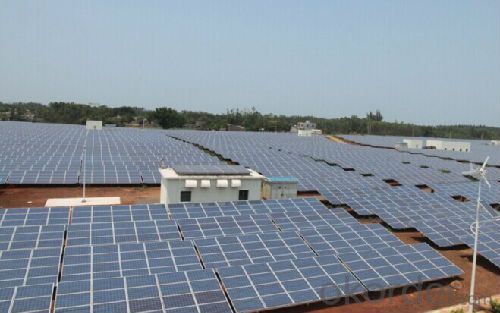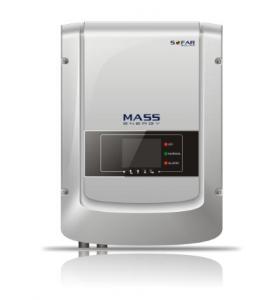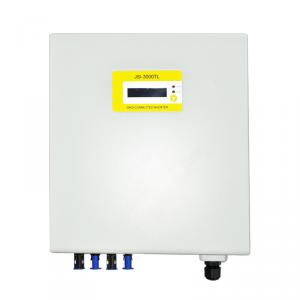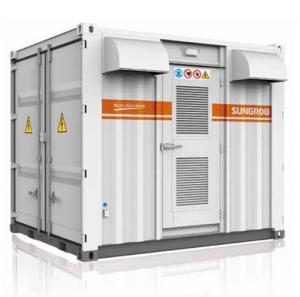Sunpower Solar Inverter 3000w Grid-Tied Solar PV Inverter 3000TLM
- Loading Port:
- Shekou
- Payment Terms:
- TT or LC
- Min Order Qty:
- 10 unit
- Supply Capability:
- 99999 unit/month
OKorder Service Pledge
OKorder Financial Service
You Might Also Like
3000W Grid-tied Solar PV Inverter 3000TLM
High-yield
•Max 97.6%efficiency
•Real timeprecise MPPT algorithm for max harvest
•Wide inputvoltage operation range from 100V to 550V
•Two MPPtrackers for flexible PV panel configuration
3000W Grid-tied Solar Inverter Low maintenance cost
•Rust-freealuminumcovers
•Flexiblemonitoring solution
•Multifunctionrelay can be configured to show various inverter information
3000W Grid-tied Solar Inverter Flexible and economicalsystem solution
•Free siteselection due to IP65
•Easy installationand maintenance due to “Plug & Play” connection
•Interfaceselection-Wi-Fi/RS485/DryRelay for more flexible configuration and system monitoring
•4” LCDdisplay
3000W Grid-tied Solar Inverter Intelligent grid management
•Reactivepoweradjustable
•Self powerreducerwhenover frequency
•Remoteactive/reactivepower limit control
3000W Grid-tied Solar Inverter Datasheet
Technical Data | SOFAR 3000TLM | SOFAR 3680TLM | SOFAR 4000TLM | SOFAR 4600TLM | SOFAR 5000TLM |
Input (DC) | |||||
Max. Input Power | 3100W | 3800W | 4160W | 4800W | 5200W |
Max. DC power for single MPPT | 2000 (200V-500V) | 2400 (200V-500V) | 2600 (200V-500V) | 3000 (200V-500V) | |
Number of independent MPPT | 2 | ||||
Number of DC inputs | 1 for each MPPT | ||||
Max. Input Voltage | 600V | ||||
Start-up input voltage | 100V(+/-5V) | ||||
Rated input voltage | 360V | ||||
Operating input voltage range | 100V-550V | ||||
MPPT voltage range | 160V-500V | 165V-500V | 175V-500V | ||
Max. Input current per MPPT | 10A/10A | 12A/12A | 13A/13A | 15A/15A | |
Input short circuit current per MPPT | 12A | 14A | 16A | 18A | |
Output(AC) | |||||
Rated power(@230V,50Hz) | 3000VA | 3680VA | 4000VA | 4600VA | 5000VA |
Max. AC power | 3000VA | 3680VA | 4000VA | 4600VA | 5000VA |
Nominal AC voltage | L/N/PE, 220, 230, 240 | ||||
Nominal AC voltage range | 180V-270V | ||||
Grid frequency range | 44~55Hz / 54~66Hz | ||||
Active power adjustable range | 0~100% | ||||
Max. Output Current | 13A | 16A | 17.5A | 20A | 22A |
THDi | <3% | ||||
Power Factor | 1(Adjustable +/-0.8) | ||||
Performance | |||||
Max efficiency | 97.6% | ||||
Weighted eff.(EU/CEC) | 97.1%/97.3% | ||||
Self-consumption at night | <1W | ||||
Feed-in start power | 20W | ||||
MPPT efficiency | >99.5% | ||||
Protection | |||||
DC reverse polarity protection | Yes | ||||
DC switch | Optional | ||||
Protection class / overvoltage category | I/III | ||||
Input/output SPD(II) | Optional | ||||
Safety Protection | Anti-islanding, RCMU, Ground fault monitoring | ||||
Certification | CE, CGC, AS4777, AS3100, VDE 4105, C10-C11, G83/G59 (more available on request) | ||||
Communication | |||||
Power management unit | According to certification and request | ||||
Standard Communication Mode | Wifi+RS485 | ||||
Operation Data Storage | 25 years | ||||
General data | |||||
Ambient temperature range | -25℃ ~ +60℃ | ||||
Topology | Transformerless | ||||
Degree of protection | IP65 | ||||
Allowable relative humidity range | 0 ~ 95% no condensing | ||||
Max. Operating Altitude | 2000m | ||||
Noise | <25dB | ||||
Weight | 18kg | ||||
Cooling | Nature | ||||
Dimension | 344×478×165mm | ||||
Warranty | 5 years | ||||


- Q: How does a solar inverter handle power surges or fluctuations?
- A solar inverter handles power surges or fluctuations by using advanced circuitry and protective measures. It typically includes surge protection devices that can absorb excessive voltage spikes, diverting them away from the system. Additionally, the inverter continuously monitors the grid voltage and adjusts its own output accordingly to maintain a stable and safe supply of electricity.
- Q: What is the role of anti-islanding protection in a solar inverter?
- The role of anti-islanding protection in a solar inverter is to ensure the safety of electrical grid workers by preventing the solar inverter from energizing the grid during a power outage. It is designed to detect grid failures and immediately disconnect the solar system from the grid, avoiding a potentially dangerous situation known as islanding. This protection feature helps maintain the stability and integrity of the electrical grid and protects both the grid workers and the solar system itself.
- Q: How does a solar inverter handle voltage and frequency variations caused by grid faults?
- A solar inverter is designed to handle voltage and frequency variations caused by grid faults through a process known as grid support or anti-islanding function. When a grid fault occurs, such as a sudden drop in voltage or frequency, the solar inverter detects the disturbance and responds accordingly. To handle voltage variations, the solar inverter typically incorporates a voltage control mechanism. It monitors the grid voltage continuously and adjusts its own output voltage to match the grid voltage level. In the event of a voltage drop or spike caused by a grid fault, the inverter adjusts its output voltage accordingly to maintain a stable and safe operating condition. This helps protect both the solar system and the grid from potential damage. Similarly, the solar inverter also deals with frequency variations caused by grid faults. It constantly monitors the grid frequency and adjusts its own output frequency to match the grid frequency. If a grid fault results in a sudden change in frequency, the inverter responds by adjusting its own frequency accordingly. This ensures that the solar system remains synchronized with the grid and continues to supply power without disruptions. Additionally, solar inverters are equipped with anti-islanding protection, which means they are designed to quickly disconnect from the grid in the event of a grid fault. This is a safety measure to prevent the solar system from continuing to supply power to a faulty grid, which could pose a risk to utility workers trying to repair the fault. Overall, a solar inverter's ability to handle voltage and frequency variations caused by grid faults is crucial for the safe and efficient operation of a solar power system. By continuously monitoring the grid conditions and adjusting its output accordingly, the inverter ensures that the solar system remains in sync with the grid and provides stable and reliable power.
- Q: Can a solar inverter be used with concentrated solar power systems?
- Yes, a solar inverter can be used with concentrated solar power systems. Concentrated solar power (CSP) systems use mirrors or lenses to concentrate sunlight onto a receiver, which then converts the sunlight into heat. This heat can then be used to generate electricity through various means, including steam turbines. In order to convert this heat-generated electricity into the required alternating current (AC) for use in homes and businesses, a solar inverter is needed. Therefore, a solar inverter is an essential component in connecting and integrating the electricity generated by concentrated solar power systems into the power grid.
- Q: What is the role of a reactive power controller in a solar inverter?
- The role of a reactive power controller in a solar inverter is to regulate and maintain the power factor of the inverter output. It ensures that the reactive power generated by the solar panels is properly balanced with the active power, thereby optimizing the efficiency and stability of the solar power system.
- Q: Grid-connected inverter is generally divided into photovoltaic power generation grid-connected inverter, wind power grid-connected inverter, power equipment and grid-connected inverter and other power generation equipment power generation inverter.
- Grid-connected inverter is generally used with large-scale photovoltaic power plant system, a lot of parallel PV string is connected to the same set of inverter DC input, the general power of the use of three-phase IGBT power module, power
- Q: How does the temperature affect the performance of a solar inverter?
- The temperature can significantly affect the performance of a solar inverter. As the temperature increases, the efficiency of the inverter decreases. This is because the internal components of the inverter can overheat, leading to a decrease in power conversion efficiency. Additionally, high temperatures can also cause voltage drops and create thermal stress on the components, which can further impact the performance and longevity of the inverter. Therefore, it is crucial to consider temperature management and cooling mechanisms to ensure optimal performance and reliability of a solar inverter.
- Q: Are there any specific installation requirements for solar inverters?
- Yes, there are specific installation requirements for solar inverters. They need to be installed in a well-ventilated area, away from direct sunlight and extreme temperatures. Additionally, they should be mounted securely on a wall or a rack, with proper clearance for maintenance and airflow. The installation should follow electrical safety guidelines and be performed by a qualified professional.
- Q: What is the role of a solar inverter in preventing electrical hazards?
- The role of a solar inverter in preventing electrical hazards is to convert the direct current (DC) power generated by solar panels into alternating current (AC) power that can be used in homes and businesses. By regulating the voltage and frequency of the electricity, the inverter ensures that the power is safe and compatible with the electrical grid. Additionally, solar inverters have built-in safety features such as ground fault protection and rapid shutdown mechanisms, which help prevent electrical hazards such as fires, shocks, and damage to the system.
- Q: What is the maximum power output of a solar inverter?
- The maximum power output of a solar inverter depends on its capacity and specifications. It can range from a few hundred watts to several kilowatts for residential inverters, and even higher for commercial or utility-scale inverters.
Send your message to us
Sunpower Solar Inverter 3000w Grid-Tied Solar PV Inverter 3000TLM
- Loading Port:
- Shekou
- Payment Terms:
- TT or LC
- Min Order Qty:
- 10 unit
- Supply Capability:
- 99999 unit/month
OKorder Service Pledge
OKorder Financial Service
Similar products
Hot products
Hot Searches
Related keywords




























